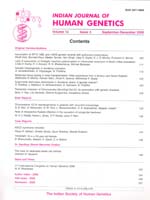
|
Indian Journal of Human Genetics
Medknow Publications on behalf of Indian Society of Human Genetics
ISSN: 0971-6866 EISSN: 1998-362x
Vol. 12, Num. 3, 2006, pp. 152-153
|
Indian Journal of Human Genetics, Vol. 12, No. 3, September-December, 2006, pp. 152-153
News and Views
11th International Congress on Human Genetics 2006
Mukherjee MB
Institute of Immunohaematology (ICMR), 13th Floor, NMS Building, KEM Hospital, Parel, Mumbai - 400012
Correspondence Address:Institute of Immunohaematology (ICMR), 13th Floor, NMS Building, KEM Hospital, Parel, Mumbai - 400012
Code Number: hg06030
The 11th International Congress of Human Genetics was organised jointly by International Federation of Human Genetics and Human Genetics Society of Australia from 6th to 10th August, 2006 at Brisbane Convention and Exhibition Centre, Brisbane, Australia. The Congress was inaugurated by the Deputy Premier of Queens land state and was attended by about 1500 delegates from different countries with 15 from India. This congress was not only for the geneticists and technologist but also involved the clinicians and social scientists which made this meeting unique. The programme included plenary lectures, invited lectures, invited workshops, satellite symposium, oral and poster presentations on different aspects of genetics. Topics covered over 4 days included Cancer Genetics, Pharmacogenetics, Gene Expression, Cytogenetics, Genetic Epidemiology, Genetic Counselling and Education, Genetic services, Genomics, Bioinformatics, Linkage Analysis, Therapy for Genetic Disorders, Comparative Genomics, Neurogenetics, Immunogenetics, Epigenetics, Ethicial, Legal and social issues. The plenary and invited lectures were all delivered by International experts in different fields. The session on "High Throughput Strategies and Techniques for Genomic Research" dealt with recent advances in micro array technology as a diagnostic tool. A new micro array based diagnostic tool for re sequencing the entire BRCA1 and BRCA2 genes has been developed by using oligo-nucleotide - micro array technology and designing a custom Sequence-Array for the coding region of both genes. This array based sequencing technology has the capability to efficiently and cost-effectively generate large-scale sequencing data of genes and in particular applicable to large genes with numerous different mutations, like BRCA. In the invited session on "Progress in the Treatment of Pedicatic Immunopathies by Gene Therapy", Dr. G. Bordignon from Italy spoke on stem cell gene therapy for genetic diseases. Six ADA-deficient children who lacked an HLA identical donor have been treated. Following gene therapy, vector ADA + Cells became progressively the large majority of T, B and NK cells. This resulted in the progressive increase of peripheral blood lymphocyte counts, and normalization of proliferative responses to mitogens and antigens. Serum Ig levels improved and production of specific antibodies after antigen vaccination was observed in two patients. Overall, the level of immune reconstitution and myeloid engrafment correlated both with the dose of infused transduced CD34+ cells and the actual degree of myelosuppression. Presently all the children are healthy and did not experience any severe infections during 5 years follow up. In this session there were two other interesting talks on "Gene therapy for severe combined Immunodeficiency" and "Correction of Chronic Granulomatous Disease by Gene Therapy: Results from a Phase I clinical trial". The session on Advances in Reproductive Genetics covered non-invasion prenatal diagnosis approached using cell-free nucleic acids in the body fluids of pregnant women and maternal plasma Two new developments have recently opened up new areas of investigation. 1) Fetal epigenetic signature could be used as markers of fetal DNA in maternal plasma. 2) Placental mRNA in detectable in maternal plasma. Dr. DW Bianchi from USA spoke on the development of new bio markers for prenatal diagnosis using maternal body fluids. Specific disease models such as congenital diaphragmatic hemia and twin-to-twin transfusion were used to understand the effects of gestational age and specific pathology on fetal gene expression by analyzing cell-free mRNA levels in maternal plasma. The preliminary data of fetal gene expression in amniotic fluid showed that identification of novel genes. The workshop on "Genetics and Public health in Developing Countries" included presentations by the experts from USA, South Africa, Brazil, Australia and Belgium. The topics covered in the Workshop were "Setting for genetic services". "How to design community based prevention programme". "The role of international foundations and European union for the development of genetic services in developing countries". The session on "Pharmacogenetics Approaches to Complex Diseases" had 5 special lectures looking at pharmacogenetic studies of genetic variants like cardiovascular and matabolic diseases. This also included the presentations on the role of single nucleotide polymorphism (SNPs) in improving drug therapy and the genetic determinants of drug response at DNA, RNA and protein levels by using DNA micro array analysis. An interesting plenary lecture was delivered by Dr. Edison T Liu from Singapore on "Expression Genomics and p53 Biology". He talked of the transcript profile in 251 primary breast cancers in which p53 gene had been sequenced and identified a clinically embedded 32 gene expression signature which distinguishes p53 mutant and wild type tumors as well as the role for GSK-3 beta in regulating p53 function in human colorectal cancer cells. He also talked the precise mechanisms of p53 gene regulation by developing a robust approach which couples chromatin immunoprecipitation (ChIP) with the paired-end ditag (PET) sequencing strategy for unbiased and precise global localization of p53 binding sites. There were 14 oral paper and 4 poster presentation sessions which included 120 and about 824 presentations respectively from different countries. My poster presentation on "Molecular heterogeneity of glucose-6-phosphate dehydrogenase variants amongst the tribals of India" based on 102 G6PD deficient alleles from eight different tribal groups of India showed the genetic heterogeneity of G6PD mutations as well as a segregation of three G6PD variants among the tribal groups of India.
Overall this Congress was very fruitful and learnt more about the recent developments in Research on Modern Genetics. This Congress also provided a platform to meet leading International Scientists for interaction and fruitful discussion with them.
Copyright 2006 - Indian Journal of Human Genetics
| 